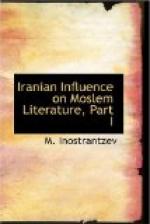[Sidenote: Zend Ave-ta.]
He [Zaradusht] also had composed a book about which people said that it was revealed to him, namely, the Zand Awasta which divides the world into two parts, Mino or the spiritual and Geti or the corporeal; that is to say, into spiritual and corporeal worlds, or in other words, into mental and physical. And just as the creation is divided into two worlds, so according to him, all that was in the world was again divided into two, namely, Bakhshis [Haarbrucker translates Bakhshis by gnade or favour, but the original Arabic expression is takdir which means destiny, and kunish or deed, by which are meant pre-destination By God and human action.]
[Sidenote: Zoroastrian Ethics.]
Further, he discussed the duties relating to the religious law and these have reference to the movements of man. He divided them into three parts Manish, Guyish and Kunish, meaning thereby belief, speech, and act, and these comprehended all the duties. When in this a man is wanting he is out of obedience and out of creed. But if he conducts himself in these three movements according to the standard of the law and the ordinance he attains to the highest good.[1]
[Footnote 1: Here is an instance where the Arab philosopher and writer hands down to posterity the spirit of Zoroastrianism without prejudice and with precision.]
[Sidenote: Some Miracles explained.]
The Zaradashtiya ascribed to Zaradusht a number of miracles including that while Zaradusht was thrown into prison the forefeet of the horse of Bishtasb entered into its body. When he was set at liberty, the feet of the animal came out. Next, it is said that he happened to pass a blind man at Dinawar and to have told him, “Take the herb”, which he described to him “and press its juice into your eye and you will be able to see”. This was done and the blind man was restored to his sight. This, however, is to be attributed to his knowledge of the properties of the herb and so it is in no wise a miracle. (Here Gotthiel omits one section on the Saisaniya and the Bihafridiya[1]).




